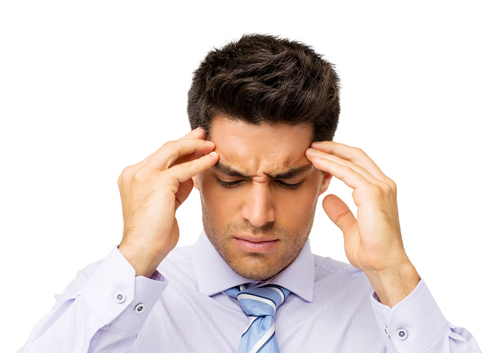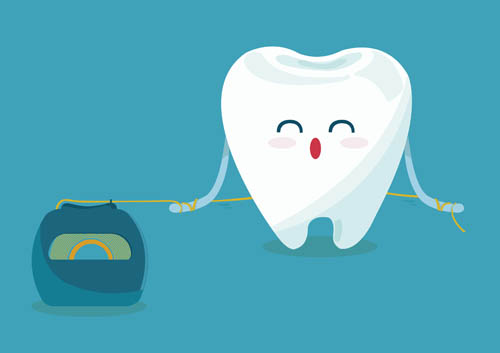December 23rd, 2016

Many people suffer through headaches for years without getting to the root cause of their problem. If you find yourself constantly popping painkillers to get through the day, it might be worth a trip to see a medical professional – but it may not be the person you think.
Talking to Dr. Dale Scharine and Dr. Alissa Edwards can be a great start when dealing with chronic headaches, because dental issues frequently contribute to head pain. In fact, the American Academy of Craniofacial Pain estimates that 80% of headaches are caused by muscle tension, which often originates in the jaws.
What Do Tension Headaches Feel Like?
A tension headache can originate on one side of your head or can pervade your entire skull. Typically, tension headaches feel like a dull, throbbing ache inside your head. Some patients at our Appleton, WI office report that they feel as though a metal band has been wrapped around their head and is causing significant pressure. Several common symptoms suggest that tension headaches may be caused by dental issues:
- Feeling as though your head or scalp is painful to the merest touch
- Experiencing a dull or throbbing pain behind the eyes
- Clicking or popping sounds in your jaw joints
- Grinding teeth or clenching the jaws, particularly in times of anxiety or during the night
- Feeling as though your jaw muscles are sore when you wake up from sleep
Dental Origins of Headaches
Several dozen muscles control your facial expressions, jaw movements, and motions such as swallowing. When these muscles are contracted for long periods of time, tension builds up within the muscle and can lead to headaches. This may happen if you clench or grind your teeth at night, your bite is misaligned, or you have muscle imbalances in the jaw or neck.
Dental Treatments for Tension Headaches
Fortunately, a trip to Elite Smiles Dental can be a fruitful way to alleviate your headaches, including the following treatments:
- Bite. In many cases, correcting your bite through orthodontics releases the stress on your jaw and muscles, and reduces the frequency of headaches.
- Nightguard. A nightguard, which resembles a sports mouthguard, may also be helpful if you frequently grind your teeth or clench your jaws during sleep. Nightguards distribute the tension from your clenched jaws and reduce the possibility of dental damage.
- Physical therapy and relaxation. Correcting the posture of your shoulders, neck, and head may alleviate muscle tension associated with headaches.
December 2nd, 2016

Of all the dental hygiene techniques you can use at home to promote clean teeth and good oral health, flossing is likely to be the one that troubles most people. It can be viewed as confusing and time-consuming, but when you learn how to floss your teeth correctly, you’ll find it’s easy to do on a daily basis.
Proper flossing techniques are vital to the health of your teeth and gums. These tips will help you with the correct flossing procedures. Likewise, Dr. Dale Scharine and Dr. Alissa Edwards and our team can also help you learn how to floss effectively and efficiently.
Steps to Flossing Your Teeth Properly
- Choosing Dental Floss. You can find dental floss in various flavors, as well as waxed or unwaxed. If the floss you use seems to get stuck between your teeth, switch to waxed to make it easier.
- Flossing “Helpers.” Beginner flossers who have trouble coordinating the floss and the movements of their hands can use a floss holder to help them get in and around teeth.
- Preparing the Floss. Cut an 18-inch piece of floss to use for flossing a few teeth. This allows you to make progress before you must stop and cut another piece of floss.
- How to Hold It. Wind the ends around your middle fingers. Hold the floss taut, pinching each side with your thumbs and index fingers. Leave a couple inches free in the middle.
- The Process of Flossing. Use your index fingers to guide the floss toward your gum line. Bring it down between the teeth with a zigzag motion. Hold the floss in a C-shape around the tooth, and move it up and down along the side.
- Where to Floss. Use a clean portion of the floss to clean around and in between each tooth. Don’t forget about the molars in the back of your mouth, too!
Flossing: A Vital Part of Oral Care
Periodontal disease begins at the gum line; this is where flossing comes in. Regular flossing helps you remove plaque from the gum line and between your teeth to avoid gum disease. In conjunction with daily brushing and twice-a-year visits to Elite Smiles Dental, floss each day to maintain good oral hygiene and overall health. Gum disease can have an impact on your general health, but it doesn't have to. This easy-to-prevent condition can be avoided with regular visits to our Appleton, WI office and daily flossing. Allow our team to partner with you in maintaining a bright, shiny smile and good oral health.
November 25th, 2016

Emergency rooms are for emergencies, so before you head to the hospital because of a dental problem, you need to ask yourself this question: Is what you're experiencing really a medical emergency? While emergency room visits for dental related issues are on the rise across the United States , they’re not necessarily the best solution for every problem. Many people don't know about emergency dental care services, many of which are available 24/7, and so they go to the ER.
These types of statistics are common across the country. However, despite the numbers, not all dental problems are created equal. If you've experienced some type of injury to your mouth, jaw, or face, then an ER visit is a good idea, but if you're suffering from a toothache, cavity, or broken crown or veneer, then the ER is not the best place to handle the situation. If you're having a dental emergency, then seeking emergency dental care should be your course of action.
Seeking Long-Term Solutions
The ER doesn't provide a long-term solution to your dental issue; it only gives you temporary relief. There’s a chance they will simply hand you a prescription for pain medication and tell you to call your dentist in the morning. In the end, you’re going to be saddled with two medical bills, and nobody wants that. Even if the ER outfits you with a temporary crown or filling, you're still going to have to make a follow-up appointment our office.
There are numerous homemade remedies that can sooth tooth and gum pain. However, if you're experiencing a dental emergency, the ER is not the place to go. The specialized emergency team at Elite Smiles Dental is available to take care of every dental problem you may have. In the case of a dental emergency, don't wait any longer than necessary. Feel free to contact our Appleton, WI office at any time, day or night.
November 18th, 2016

Inflamed gums are a fairly common dental issue, but unfortunately, many people don't take the problem seriously enough. If you ignore inflamed gums and continue your usual routine, you could be encouraging a much more severe inflammation problem, and the pain that goes along with that. Fortunately, it is quite easy to relieve inflamed gums if you use the tips below.
Use Soft Bristles
A soft-bristle toothbrush - the softest you can buy - is a must for anyone with inflamed gums. Anything that makes contact with your gums can cause you pain, so fine and soft bristles are always the best choice.
Use Sensitive Formula Toothpaste
The toothpaste marketed as “Sensitive Teeth Formula” contain special ingredients to help relieve sensitivity. When your gums are inflamed, even light brushing can cause some pain. Using a special toothpaste will help reduce that pain and make it easier to brush your teeth effectively. The effect becomes stronger as you use the toothpaste more, so use it for each brushing.
Visit Our Office
If your gums remain swollen for more than a few days or a week, set up an appointment with Dr. Dale Scharine and Dr. Alissa Edwards. There is a long list of conditions that could be causing your swollen gums, everything from gum disease to pregnancy, so you need to find out where your issue is coming from. Most of the time, Dr. Dale Scharine and Dr. Alissa Edwards can easily treat the swollen gum issue at our Appleton, WI office, or can give you an effective treatment to take home.





 Website Powered by Sesame 24-7™
Website Powered by Sesame 24-7™